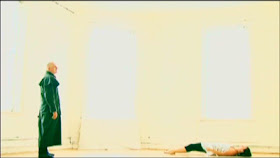 This lends credence to the theory that the camera is actually the Ghost's point of view as, driven by jealousy, it takes a peek into the adulterous bedchamber.
This lends credence to the theory that the camera is actually the Ghost's point of view as, driven by jealousy, it takes a peek into the adulterous bedchamber.The banquet itself is a much more stately affair, with everyone pretty much sitting around and talking. Claudius is a particular disappointment for me, Basil Sydney stiff in both posture and delivery.
 Some of the blame should go to the costumes (gaudy, rather than rich), and Claudius' wide shoulders-tight tights combo is particularly ludicrous. The Court certainly contrasts with Hamlet's simple black attire in this, perhaps symbolic of Denmark's complicity in Claudius' corruption (audible in this version as they mutter in agreement a number of times through the speech). Everyone's getting rich in this new regime.
Some of the blame should go to the costumes (gaudy, rather than rich), and Claudius' wide shoulders-tight tights combo is particularly ludicrous. The Court certainly contrasts with Hamlet's simple black attire in this, perhaps symbolic of Denmark's complicity in Claudius' corruption (audible in this version as they mutter in agreement a number of times through the speech). Everyone's getting rich in this new regime.Unfortunately, Syndey doesn't play Claudius sympathetically (not uncommon, actually) which makes him more transparent as the villain. He's smug and self-satisfied. A glimmer of hope exists in his relationship to Gertrude. Does he actually love her?
 His sighs denote lust for sure. He's helped along by a rather young Gertrude. Though I think she just barely pulls it off, Eileen Herlie is 11 years younger than Olivier who plays her son! Bizarre casting, but useful in establishing one of those Freudian through lines I dislike so much. The younger the Gertrude, the more sexual tension can be drawn from their Oedipal relationship. Herlie would return to the role more mature (one would think) in Richard Burton's version.
His sighs denote lust for sure. He's helped along by a rather young Gertrude. Though I think she just barely pulls it off, Eileen Herlie is 11 years younger than Olivier who plays her son! Bizarre casting, but useful in establishing one of those Freudian through lines I dislike so much. The younger the Gertrude, the more sexual tension can be drawn from their Oedipal relationship. Herlie would return to the role more mature (one would think) in Richard Burton's version.The other characters we meet here are Terence Morgan's young and enthusiastic Laertes, who should seem much changed when he returns from France with revenge in his heart.
 One would hardly believe this fresh, naive face would be credible talking about cutting Hamlet's throat in a church! The success of the character will hinge on his ability to sell the character's moral downfall. His father Polonius is played as a typical "kindly old man" by Felix Aylmer.
One would hardly believe this fresh, naive face would be credible talking about cutting Hamlet's throat in a church! The success of the character will hinge on his ability to sell the character's moral downfall. His father Polonius is played as a typical "kindly old man" by Felix Aylmer.
The Cuts Continued
Just as in Scene 1, all mention of Fortinbras, Norway and the world at large has been expunged. This takes a chance to show off away from Claudius (I'll unkindly say "mercifully" here) and reduces this Courtly meeting to the essential family affairs of the day.



















